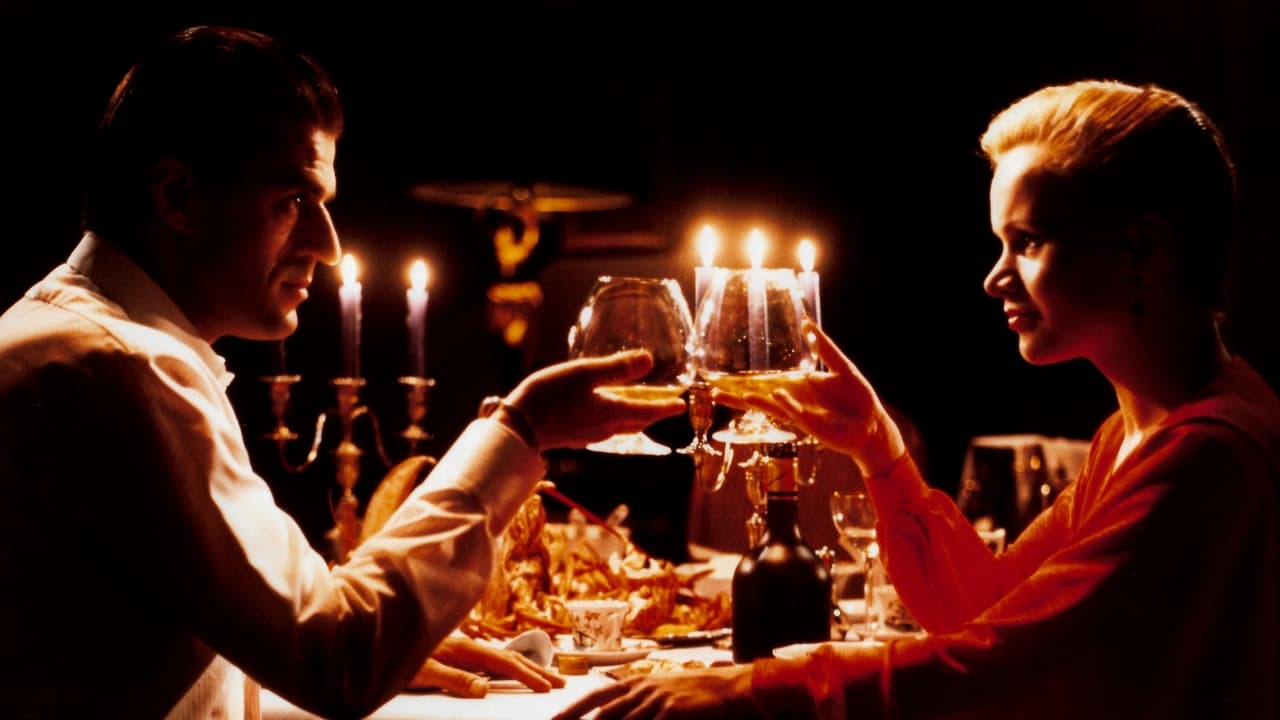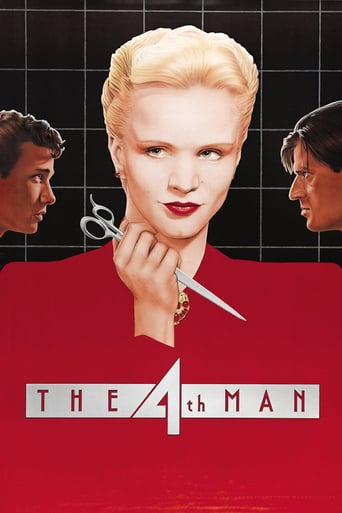

Wonderful character development!
... View MoreHorrible, fascist and poorly acted
... View MoreFantastic!
... View MoreWhen a movie has you begging for it to end not even half way through it's pure crap. We've all seen this movie and this characters millions of times, nothing new in it. Don't waste your time.
... View MoreWell known for being something of a run-through for the infamous Basic Instinct (1992), The Fourth Man (1983) remains one of maverick director Paul Verhoeven's greatest works. Like Basic Instinct, The Fourth Man blends sex and death in a delicious cocktail of mystery, suspense and exaggerated imagery; telling a story of seduction and paranoia through the eyes and mind of an unreliable narrator. In this instance, Gerard Reve; an alcoholic writer of lurid pulp fiction, who in the film's subtle and darkly sardonic opening sequence, staggers out of bed, naked and hung-over, and - in a scene of quiet confusion and matter of fact precision - garrottes his homosexual lover to the point of asphyxiation. Right from the start, Verhoeven is skilfully introducing those aforementioned themes of sex and death, as well as establishing the air of incredibly dark humour, symbolism and that sense of blurring the lines between fact and fiction to near incomprehensible levels of uncertainty, all of which will permeate the film's very core.Verhoeven has often claimed that the somewhat skewed, surreal and heavily atmospheric look and feel of the film was purposely stylised to an almost obvious degree in order to placate the high-brow Dutch film critics who had, at that particular time in his career, dismissed previous films such as Keetje Tippel (1975) and Spetters (1980) as lurid sensationalism. Whether or not this is the case is open to debate, but what most impresses here is Verhoeven's energy and skill in presenting such a taut and labyrinthine thriller that seems to draw as much on the surreal and coolly evocative psychodrama of a filmmaker like Ingmar Bergman as it does on the twisted world of Alfred Hitchcock. From beginning to end, The Fourth Man offers old fashioned suspense and bold strokes of drama, all contrasted and juxtaposed against the director's moody, European style and liberal bursts of violence and eroticism. The design of the film - rich with over-saturated light and colour, shades of autumn and lingering camera movements - suggest a world hinged somewhere between the noir-like stylisation of Bernardo Bertolucci's The Conformist (1970) and the vibrant, lurid surrealism of Dario Argento's Suspiria (1977), to add further depths to the already densely layered mystery, and to create a world that seems real, but at the same time, entirely dreamlike.The film works on a number of levels; on the one-hand, as a piece of pure entertainment, with Verhoeven's always memorable use of imagery - both grotesque and beautiful - and his scenes of upfront and often confrontational violence and sexuality. The film is as much about sexuality and desire as it is about sex; with Gerard introduced initially as gay, though he later has an affair with the central femme-fatale, but only after he has flattened her small breasts with his hands and confessed that she "looks like a boy". Later in the film he will seduce the fiancé of this character and again raise questions pertaining to the film's central enigma. In the most telling scene, Gerard attends a Q&A session for his new book. When someone in the audience asks him about his secret for writing, Gerard replies "I lie the truth". Perhaps a poor subtitle translation, but the implication that Gerard sees the world through a somewhat false perspective is certainly there; with the further elements of alcoholism, sexual confusion, lust and paranoia creating a fascinating central character, quite possibly creating the story in his mind as it moves along.There are Hitchcockian allusions as noted, with the cold, blonde femme-fatale person represented by Christine, who has an air of subtle menace and great sexuality. Is Gerard seducing her or is she seducing Gerard, and just why have three of her past husbands turned up dead in recent years? Is Gerard imagining all of this? Is he genuinely interested in Christine, or is he more interested in getting closer to the man in her life? Are his reasons purely sexual or are they a further fuelled by his lurid obsessions with death? Questions like this crop up constantly with The Fourth Man, with Verhoeven denying the audience easy answers and instead plunging headlong into surreal visions of rotting eyeballs, strung-up meat carcasses, puddles of blood and the juxtaposition of homoerotic yearning with Christ-like metaphors. There's also a continual use of black-widow symbolism apparent right from the start, as well as all the elements coming together at the end in a sort of tragic foreshadowing of events. Even then, do we believe Gerard and his wild accusations, or is this just another example of the alcoholic, over-sexed writer "lying the truth" for the purposes of fiction.The Fourth Man is a film that I haven't seen in a long time, but its images and story have always stayed with me. On my initial viewing in 2001, my familiarity with Verhoeven was based purely on his satirical Hollywood pictures, principally Robocop (1986), Total Recall (1991) and Starship Troopers (1997). I was also fairly unfamiliar with European cinema in general, meaning that the film's bold scenes of both straight and gay sex, nudity and imagined (or are they?) scenes of surreal, sexualised violence were a real revelation. A few years later I returned to the film and found it just as fascinating; with the labyrinthine plot, moody visuals, bold performances and totally entrancing story and character drawing me in; offering a great central mystery that is visually captivating and rife with a myriad of potential interpretations. It's easy to say that The Fourth Man is one of my favourite films; filled with cool irony, controversial images and ideas, and a completely fascinating, dreamlike evocation of the story at hand.
... View Morebasically, i like Verhoeven film because in his film, i enjoy a brilliant pscychosexual story that i have seen before in "Basic Instinct".it is really a wonderful thriller i enjoyed very much.so it is obviously for me to watch this another Verhoeven movie.well, it is his previous direction before his block buster hit "Basic Instinct" and for that i was very much curious to watch that movie and yeah, the movie has fulfilled my hope and expectation.this movie "The Fourth Man" is a brilliant pscychosexual drama which is a lit bit complex for some audiences. the story of this movie is about a gay writer named "Reve"(Krabbe), an alcoholic person who is lives by his own moral values and sees many visions that may warn him from a future accident.after the end of his lecture, he introduce a seductive woman named "Christine", who has a mysterious past she doesn't want to reveal.Reve do sex with her at her house as she is a boy.next morning, he watch her sexy, macho boyfriend's picture on her table, the person he met at the station.he is curious to meet him and tell Christine to invite him to her house.that's it. i don't want to reveal the entire story because it is a Verhoeven movie and the end of the film is really surprising!especially, i like the character "Reve" which is brilliantly played by "Krabbe".i basically like his acting because as a gay person i am purely identified with his character and yeah i like his charming face.i would like thanks Mr.Verhoeven to make such a black comedy.i rate this movie: 10 out of 10.
... View MoreI saw this movie in my international cinema class and was grossed out from get go. This movie is nothing but one scene of blatant shock value after the next.The 4th Man is about an alcoholic writer named Reve, who has visions of his in-pending danger. He meets up with a woman named Christine when giving a lecture at a local book club, and only decides to stay with her when he discovers how attractive her boyfriend is. To put it plainer, Reve likes the Dutch sausage. So Reve concocts a plan to seduce Christine's boyfriend so he can ultimately have sex with him. But its later discovered that Christine has had 3 previous husbands, who she all murdered. Now Reve and Christine's boyfriend could be "THE 4TH MAN." The storyline makes sense with no plot holes. The editing and everything else that is technical about this movie is perfectly fine. The movie is just gross and I felt the need to vomit in some parts. Basically, this isn't my cup of tea.The movie opens with Reve getting out of bed in JUST a t-shirt. So in the very beginning, you get to see Reve's lovely pecker flopping around as he walks around his cramped apartment in a hangover state. Later on he has a dream where his pecker gets cut off by a pair of scissors, and they do show it along with the blood fountain that ensues. Reve fondles a statue of Jesus and has homosexual sex in a mausoleum. Plus there's a lot of blood. More blood than all the Freddy Krueger movies combined.Not that I have anything against "shocking" scenes, but this movie is just so blatant when it comes to shocking. The whole movie is revolved around the shock value.So if any of this is your cup of tea, watch this movie. Otherwise, stay far far far far far away from this one. My mind is still scarred.
... View MoreThis is the last Dutch language film Paul Verhoeven made before going on to make mainstream Hollywood films "Basic Instinct," "Robocop," and "Total Recall," among others. He sets the stage by opening this story with a black widow spider catching prey in her web before we meet Gerard Reve, an annoying self-centered writer with a morbid imagination. Gerard has been invited to be the guest speaker at a Literary Club meeting in sea-side town an hour or so from Amsterdam. Verhoeven lets us have glimpses of how Gerard's imagination twists reality. Asked if writers are a bit close to insanity he admits when he reads the newspaper "and it says 'boom' I read 'doom,' when it says 'flood' I read 'blood,' when it says 'red' I see 'dead.'" When he tells a story enough times he begins to believe it; "I lie the truth." He accepts an offer to be the overnight guest of the Club treasurer, a beautiful wealthy salon owner. As he gets to know her and learns her husband has died, he begins to imagine she is 'a black widow.' Is this his more of his reality twist or is she a murderess? This is a psychological drama and in recounting which of these old films have stuck in my memory, I figured out is my favorite gender. Looking at his body of work it is seems to be Paul Verhoeven's too, and he is a master in making us question our own understanding of reality. It's a nice change of pace from the usual Hollywood fare. I saw it in 1983 and it is a film that "stuck."
... View More